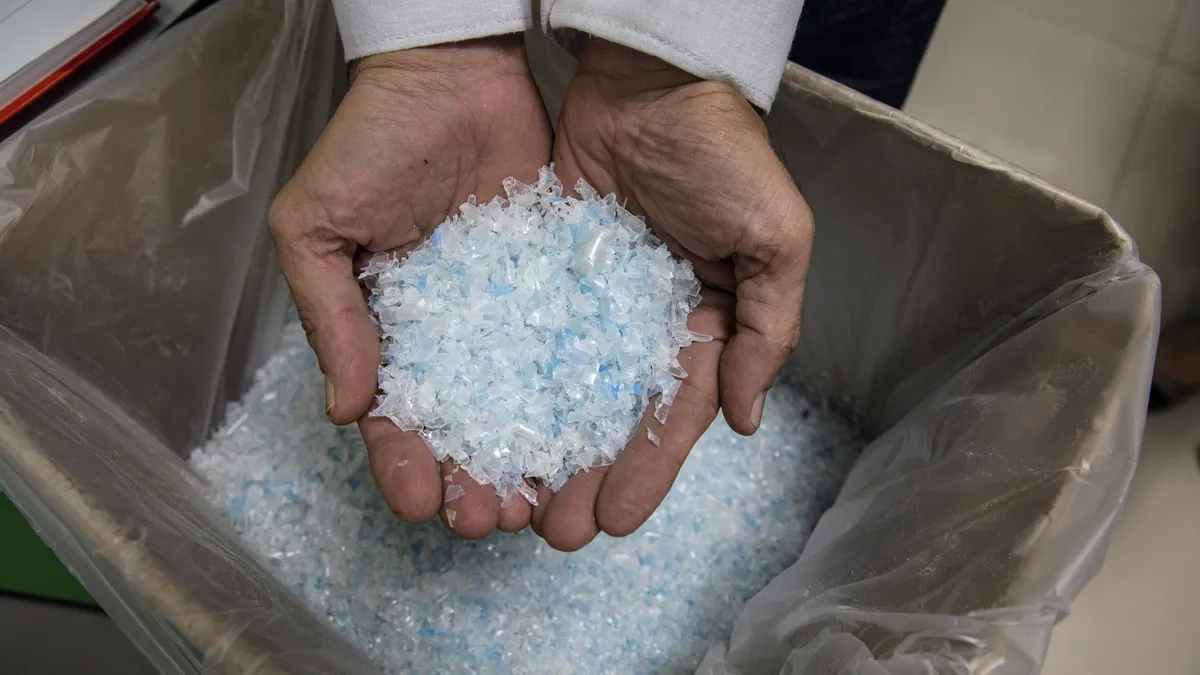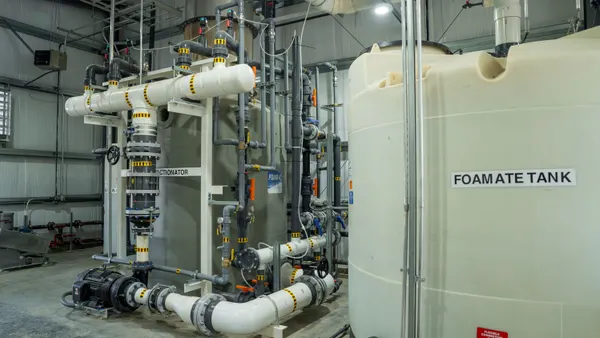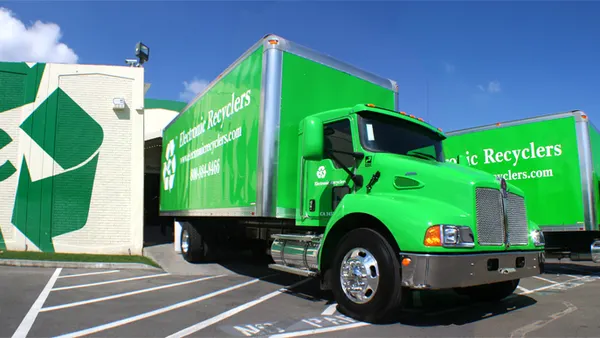Dive Brief:
- Dow, LyondellBasell and NOVA Chemicals have pledged to invest a total of $25 million in a new fund meant to boost recycling technology, infrastructure and markets for recycled polypropylene and polyethylene.
- The Closed Loop Circular Plastics Fund, managed by investment firm Closed Loop Partners, is meant to bridge the gap between producer demands for more recycled PP and PE plastics and the capacity and funding challenges recyclers face in processing and selling it.
- With additional investments from financial and corporate partners, the fund is expected to offer $100 million over the next 10 years. Supporters see the fund as a way to spur innovation and market development, with stakeholders hoping the money will also be used for improvements such as collection, sortation and infrastructure.
Dive Insight:
The Circular Plastics Fund group sees major business potential for further developing PP and PE markets, but says these resins lag behind more established markets for PET and HDPE. Inefficient or outdated recycling technology, as well as "systemic bottlenecks [and] misaligned incentives and policies" are to blame, the group said in a release announcing the fund.
Ron Gonen, founder and CEO of Closed Loop Partners, said the technology already exists to put PP and PE back in the supply chain, and there is a proven demand for those resins. The fund aims to support innovations that will smooth out the bumps in the road between the two.
"It’s a chicken and egg scenario," he said. The public is not always clear on whether or not these plastics are accepted for recycling and may not put them in their blue bin, "so MRFs are wary or hesitant to invest in technology to sort it while manufacturers are trying to build the capacity to use it in products."
The fund focuses on three main areas. One is increasing access to collection, which could include approaches like improving recycling sortation technologies as well as the logistics and transportation of the material. The fund will also focus on optimizing recycling systems to better capture materials considered to be high-quality, such as food-grade and medical-grade plastic. It also focuses on investing in facilities and equipment to manufacture products or packaging made from the recovered plastic.
The group aims to fund projects that recycle over 500 million pounds of both post-consumer and post-industrial plastics over the next 10 years. These investments could go to projects from well-established companies as well as startups, universities, governments or other entities, Gonen said.
Closed Loop sees Dow, LyondellBasell and NOVA as fitting partners because of their plastics industry experience and their "vested interest" in seeing recycled plastic efforts take shape, in part because the companies have made brand commitments to use recycled resins. The current supply of recycled plastic meets only 6% of the demand, the group said in the news release.
NOVA Chemicals in April announced it will start producing three grades of 100% post-consumer PE plastic resin, and Luis Sierra, the company’s president and CEO, said in an email that the Closed Loop investment partnership is a fitting way to "bring new and different funding to create a circular economy" in the U.S. and Canada.
LyondellBasell CEO Bob Patel sees the company’s involvement in the new fund as a logical step that builds on other plastics sustainability work it has pursued over the last few years, which includes innovating both mechanical and "molecular" recycling methods. The company plans to produce 2 million metric tons of either recycled plastics or renewable based plastics per year by 2030, according to its 2019 sustainability report.
Dow offers a 70% recycled LDPE resin, and it says its larger sustainability strategy entails investing in projects and programs that help it to collect, reuse or recycle 1 million metric tons of plastic by 2030.
Joshua Baca, vice president of plastics for the American Chemistry Council, said the new fund is an example of how the plastics industry can lead innovations that keep plastic out of the environment. ACC "strongly encourage[s] others to join their efforts to grow this fund and accelerate private sector investment to improve plastics recycling infrastructure across the country," he said.
Steve Alexander, president of the Association of Plastic Recyclers, said the organization welcomes funding mechanisms that will give recyclers better tools to create cleaner streams of plastics.
"Any program that includes additional funding for the collection, sortation and recycling of materials is welcome," he said. "The problem lies in the fact that consumer-facing packaging is overwhelming our sortation systems to the point where we need additional capacity to sort the material better to present it for recycling."
Alexander said innovations such as chemical recycling are an important part of the plastics recycling ecosystem, but he cautioned that APR would not support the fund being used for projects aimed at "diverting good, easily recyclable materials away from the recycling stream" such as some kinds of chemical recycling that wouldn’t result in the creation of new plastics.
The new fund shows growing support for nurturing plastics recycling in the U.S. The Circular Plastics Fund debut follows The Recycling Partnership's March announcement that it would launch a second round of grant funding for its Polypropylene Recycling Coalition, an effort to advance PP recycling through up to $3 million in grants for MRFs.
Closed Loop Partners has facilitated funding for other types of recycling circularity projects, and the fund fits into the investment firm’s larger Advancing Circular Systems for Plastics initiative that has partnered with cities, MRFs, chemical recycling plants, sortation robotics companies, and reuse and refill systems.











